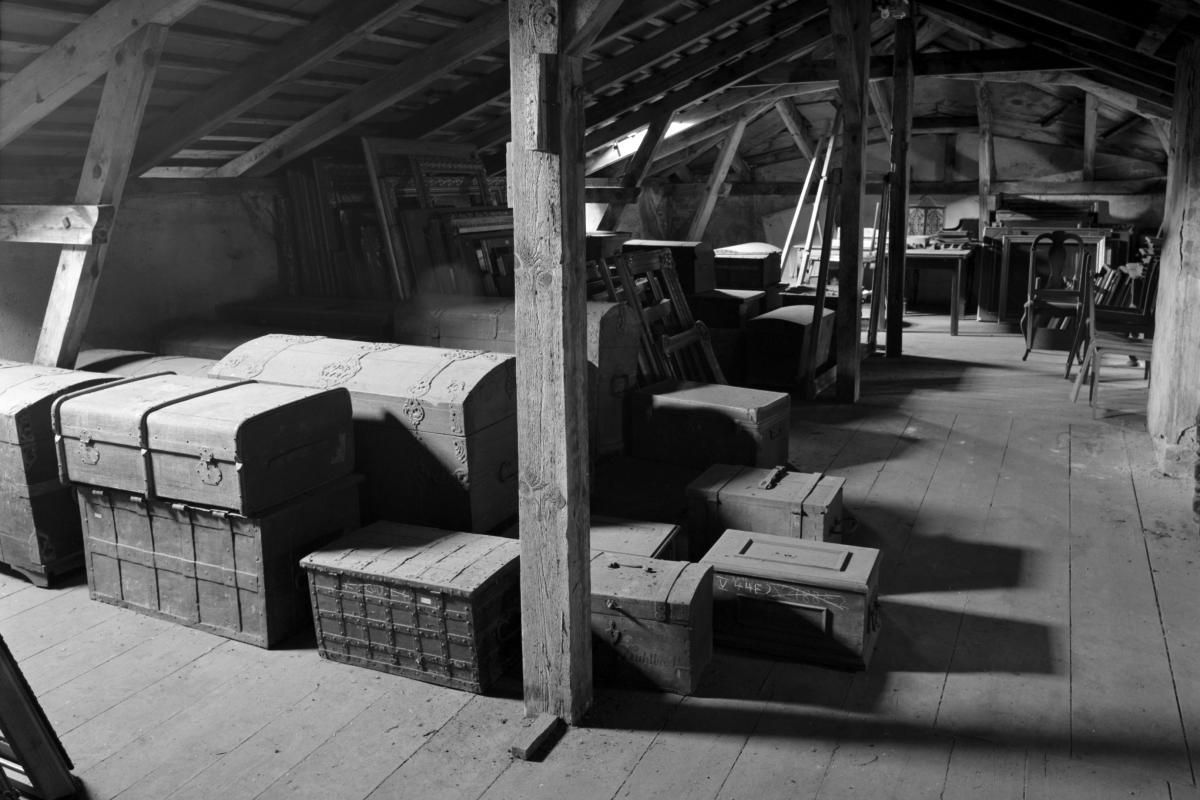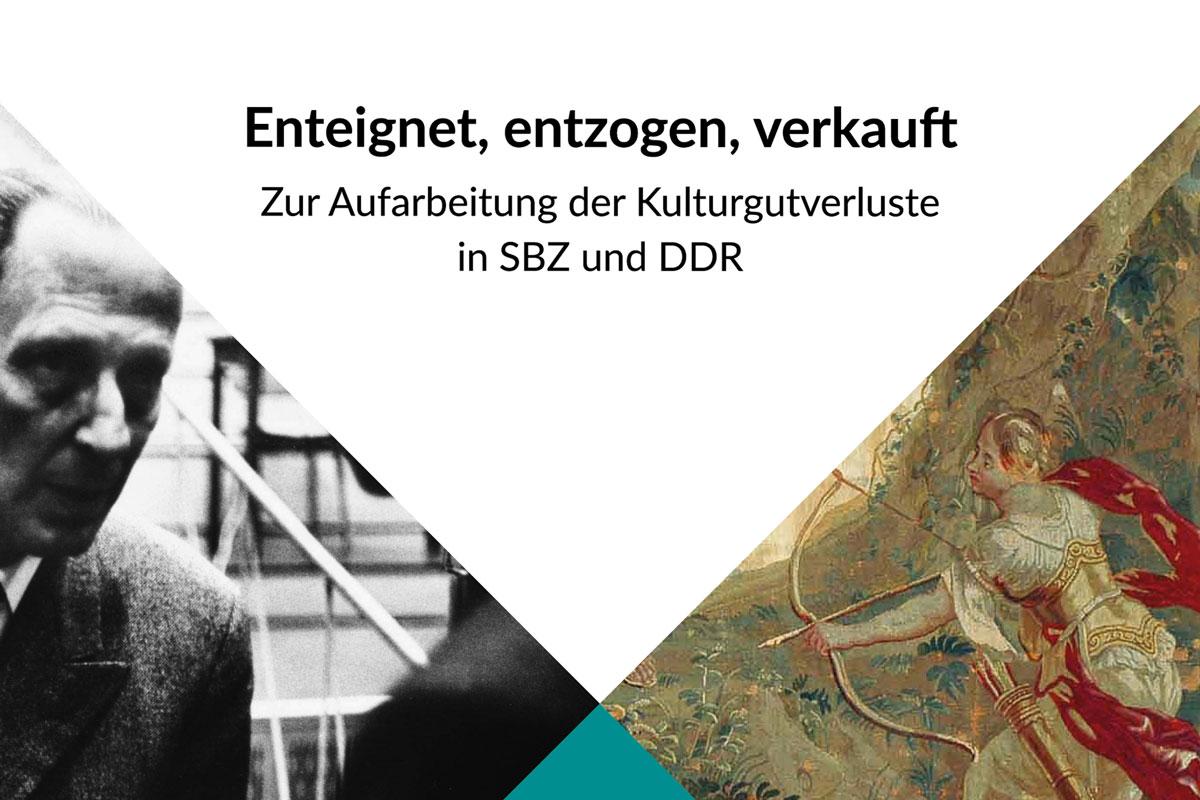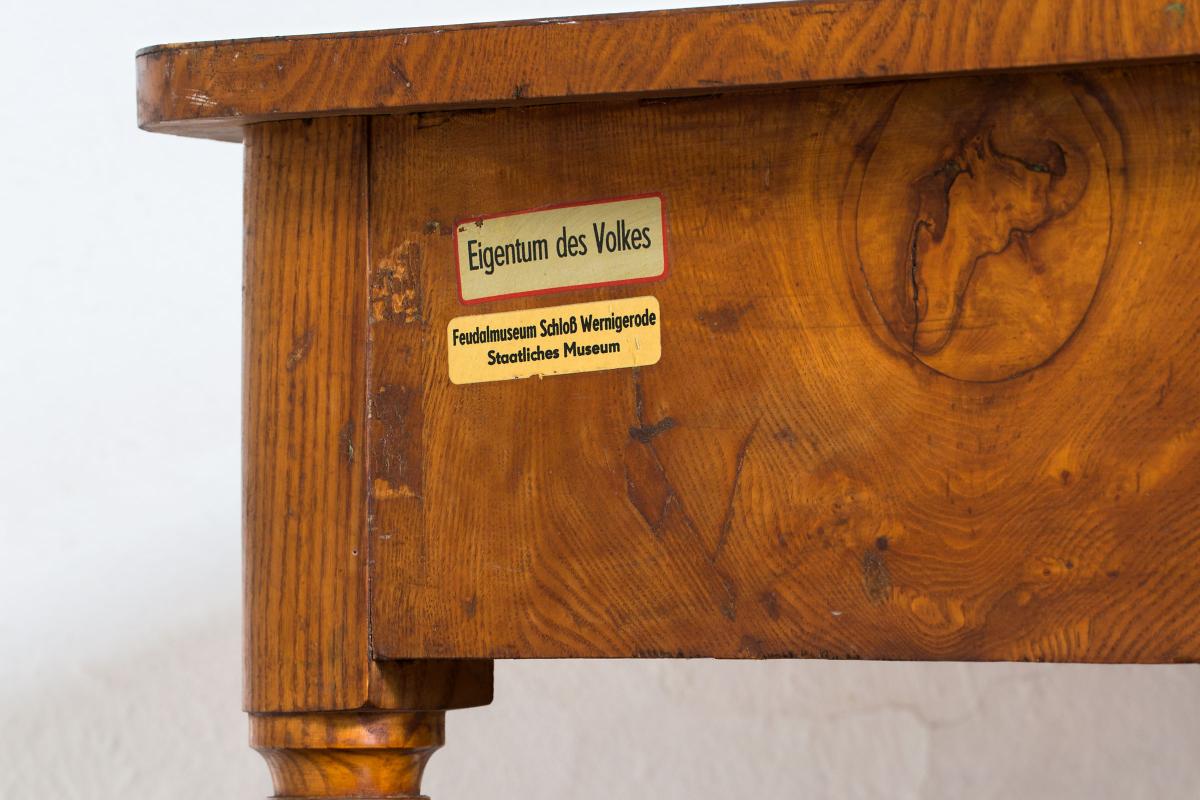Soviet Occupation Zone & GDR: Basics and Overview
Historical Background
Key Events
End of the war
Start of the land reform
Foundation of the GDR
Uprising of 17 June
Profiling of museums
Building of the Wall
„Aktion Licht“
Foundation of KoKo
Foundation of Kunst & Antiquitäten GmbH
Beginning of the Monday demonstrations
Destruction of files in the MfS
Fall of the Wall
Dissolution of the KuA
Basic Research
Basic Documents
January 2015 until January 2016: Development of a funding basis for research into the expropriation of cultural assets in the Soviet occupation zone and the GDR
On 22 January 2015, the Foundation Board decided to commission the Executive Chairman, with the participation of the Ministers of Education and Cultural Affairs of the federal states of Berlin, Brandenburg, Mecklenburg-Western Pomerania, Saxony, Saxony-Anhalt and Thuringia, to draft the first basic guidelines for a funding concept for research into cultural property expropriated or lost in connection with persecution and arbitrary measures in the Soviet occupation zone and in the GDR.
As a result of a brainstorming session hosted by the Foundation in Berlin on 28 October 2015, a working group was formed under the leadership of the Foundation to prepare these basic guidelines and to collate ideas for a conference on the subject of the expropriation of cultural property in the Soviet occupation zone and the GDR on 21 November 2016 in Berlin.
This showed that more than 25 years after the end of the GDR, there are fundamental desiderata with regard to systematic research into the historical processes, structures and methods, the authorities, institutions involved and actors involved, and in particular the victims or aggrieved parties of the state-operated expropriation of art and cultural property between 1945 and 1989.
There is a lack of both case studies and overviews on a number of topics, for example the aspect of “palace salvage”, i.e. the “emptying” of stately homes and castles in connection with the land reform in the Soviet occupation zone.
There are more extensive deficits in research into the history of the cultural, economic and social policy of the GDR, which ultimately led to the social exclusion and disdain for private collecting of art and cultural property on the one hand, while also resulting in the arbitrary and unlawful expropriation of collection items for export to non-socialist foreign countries and to the Federal Republic for the purpose of earning foreign currency. Studies are needed here that go beyond the existing publications on the practices of criminalising art dealers and collectors in the GDR and the sale of expropriated objects by the Bereich Kommerzielle Koordinierung (KoKo) and specifically the art-dealing company Kunst- und Antiquitäten GmbH (KuA).
Fundamental research is needed to retrace the organisational and procedural structures involved in the expropriation and exploitation of art and cultural property in the GDR, covering the central, regional and district level: which party or state leadership had which decision-making powers, which “state organ” carried out the expropriations, which state enterprise was entrusted with the sale and management of the proceeds, and what was the role of experts in the museum, library and university sectors?
Against this background, the first measures envisaged are as follows:
- Basic research: As representative examples, investigations will be carried out into the 1962 operation Aktion Licht carried out by the GDR’s Ministry of State Security (opening of safes, securities accounts and safe deposit boxes in almost all banks in the GDR for which there were generally no identifiable owners) and the history of the safe deposit administration of the GDR’s Ministry of Finance, with particular reference to its role in the allocation of expropriated, confiscated cultural property or that which was deemed “ownerless”. Here, consideration is being given to a research project in cooperation with the Prussian Cultural Heritage Foundation and the Dresden State Art Collections together with a contemporary history research institute. The structures and mechanisms are to be examined in this context on an exemplary basis. Only when the latter are known will it be possible to put individual cases into context.
- Research into the history of collections at public institutions with a focus on reviewing acquisitions and allocations between 1945 and 1989: pilot projects with selected museums and libraries to produce a representative study on the nature and extent of acquisitions and allocations during the period under review. The pilot projects are intended to shed light on whether the acquisitions and allocations between 1945 and 1989 are to be regarded as potentially or factually unlawful from today’s legal and moral-ethical point of view.
- Archives: Continuation of cooperation between the Foundation, the Working Group “Cultural Property Losses – Soviet Occupation Zone/GDR” and the Federal Archives with regard to expert dialogue dedicated to indexing the file holdings of the Bereich Kommerzielle Koordinierung (KoKo) and especially those of Kunst– und Antiquitäten GmbH (KuA). The requirements and the experience of provenance research will be taken into account when creating inventories and other finding aids for these holdings in the Federal Archives (degree of in-depth indexing).
In cooperation with the Stasi Records Agency (BStU), indexing of the holdings in the BStU archive is being carried out based on the existing information on the expropriation of art and cultural property in connection with measures of political persecution in the GDR. The aim is to create finding aids here as well in order to establish the structural and organisational conditions required for provenance research to be pursued at museums, libraries and other public institutions.
Only when these prerequisites have been fulfilled and findings on the structural and procedural organisation of the state-organised unlawful expropriation of art and cultural property in the GDR are available does project funding for the investigation of holdings at public institutions appear to be sensible and promising.
6 February 2016: Initial Framework for Research into Cultural Assets Seized in the Soviet Occupation Zone and the GDR
Literature
- Anne Bahlmann, Falco Hübner, Bernd Isphording & Stefanie Klüh (eds.): Betriebe des Bereichs Kommerzielle Koordinierung. Teilbestand Kunst und Antiquitäten GmbH (1974-2002), Bestand DL 210. [Findbucheinleitung] Bundesarchiv: Berlin 2017. (= series: Findbücher zu den Beständen des Bundesarchivs) – Online unter https://www.bundesarchiv.de/DE/Content/Downloads/Meldungen/20180601-kua-findbucheinleitung.pdf (letzter Zugriff 27.03.2023)
- Anne Bahlmann, Falco Hübner, Bernd Isphording & Stefanie Klüh (eds.): Staatlicher Kunsthandel der DDR “VEH Bildende Kunst und Antiquitäten” (1974-2002), Bestand DR 144. [Findbucheinleitung] Bundesarchiv: Berlin 2017. (= Reihe: Findbücher zu den Beständen des Bundesarchivs) – Online at https://www.bundesarchiv.de/DE/Content/Downloads/Meldungen/20180601-skh-findbucheinleitung.pdf (last accessed 27.03.2023)
- Klaus Behling: Auf den Spuren der Alten Meister. Kunsthandel und Kunstraub in der DDR. Berlin 2018
- Ulf Bischof: Die Kunst und Antiquitäten GmbH im Bereich Kommerzielle Koordinierung. Berlin 2003. (= series: Schriften zum Kulturgüterschutz, Cultural Property Studies. Edited by Wilfried Fiedler, Erik Jayme & Kurt Siehr)
- Dirk Blübaum, Bernhard Maaz & Katja Schneider (eds.): Museumsgut und Eigentumsfragen. Die Nachkriegszeit und ihre heutige Relevanz in der Rechtspraxis der Museen in den neuen Bundesländern. Halle (Saale) [2012]
- Ralf Blum, Helge Heidemeyer & Arno Polzin (eds.): Auf der Suche nach Kulturgutverlusten. Ein Spezialinventar zu den Stasi-Unterlagen. (2nd, expanded edition) BStU: Berlin 2021. – Online at https://www.stasi-unterlagen-archiv.de/assets/bstu/de/Publikationen/EV_Kulturgutverluste_Auflage_02_barrierefrei.pdf (last accessed 27.03.2023)
- Günter Blutke: Obskure Geschäfte mit Kunst und Antiquitäten. Ein Kriminalreport. (2nd, modified edition) Berlin 1994
- Konrad Breitenborn, Rüdiger Fikentscher & Boje Schmuhl (eds.): Die Bodenreform in Sachsen-Anhalt. Durchführung, Zeitzeugen, Folgen. Hall a.S. 1999
- Mathias Deinert, Uwe Hartmann & Gilbert Lupfer (eds.): Enteignet, entzogen, verkauft. Zur Aufarbeitung der Kulturgutverluste in SBZ und DDR. Berlin 2022. (= volume 3 of the series Provenire, edited by the German Lost Art Foundation, Magdeburg)
- Deutscher Bundestag, Wissenschaftliche Dienste: Restitution von Kunst- und Kulturgut, das von Behörden der ehemaligen sowjetischen Besatzungszone / DDR entzogen wurde. Historischer Hintergrund und Überblick der gegenwärtigen Problemlagen. Berlin 2015. – Online at https://www.bundestag.de/resource/blob/410162/.../wd-10-010-15-pdf-data.pdf (last accessed 27.03.2023)
- Thomas Finkenauer & Jan Thiessen: Kunstraub für den Sozialismus. Zur rechtlichen Beurteilung von Kulturgutentziehungen in SBZ und DDR. Berlin 2023. (In the series Provenire, edited by the German Lost Art Foundation, Magdeburg)
- German Lost Art Foundation (ed.): Provenance & Research, issue 01/2019. Dresden 2019.
- Weddig Fricke & Klaus Märker: Enteignetes Vermögen in der Ex-DDR. (2nd, substantially revised edition) Munich 2002.
- Gilbert Lupfer, Uwe Hartmann & Mathias Deinert: Operation Ausverkauf, in: Daniel Deckers (ed.): Facetten der Gegenwart. 52 F.A.Z.-Essays aus dem Epochenjahr 2022. Paderborn 2023, pp. 202-210.
- Gilbert Lupfer & Thomas Rudert: Die “Schlossbergung” in Sachsen als Teil der Bodenreform 1945/46 und die Staatlichen Kunstsammlungen Dresden in Dresdener Kunstblätter. Vierteljahresschrift der Staatlichen Kunstsammlungen Dresden, 02-2012, p.114-122.
- Katja Margarethe Mieth (ed.): Stichwort Provenienz. Museums- und Sammlungspolitik in der DDR. Chemnitz 2011.
- Christopher Nehring: Millionär in der DDR. Die deutsch-deutsche Geschichte des Kunstmillionärs Siegfried Kath. Marburg 2018.
- Hartmut Pätzke: Der Staatliche Kunsthandel in der Deutschen Demokratischen Republik in: Kritische Berichte. Zeitschrift für Kunst- und Kulturwissenschaft (3/1993), S. 65–73. – Online at https://journals.ub.uni-heidelberg.de/index.php/kb/article/download/11180/5031/17578 (last accessed 27.03.2023)
- Alexander Sachse: Schlossbergung, Republikflucht, Kommerzielle Koordinierung. Kritische Provenienzen aus der Zeit der SBZ und DDR in: Museumsblätter. Mitteilungen des Museumsverbandes Brandenburg, issue 35 (December 2019), pp. 18-37. – Online at https://www.museen-brandenburg.de/fileadmin/Museumsblaetter/MB_35_web2.pdf (last accessed 27.03.2023)
- Jan Scheunemann: Kunst- und Kulturgutenteignungen im Zuge der Bodenreform. Das Beispiel Sachsen-Anhalt in: Museumsblätter. Mitteilungen des Museumsverbandes Brandenburg, issue 35 (December 2019), pp. 38-43. – Online at https://www.museen-brandenburg.de/fileadmin/Museumsblaetter/MB_35_web2.pdf (last accessed 27.03.2023)
- Heike Schroll: Ost-West-Aktionen im Berlin der 1950er Jahre. Potentiale und Grenzen behördlicher Überlieferungen zum Kunsthandel in der Viersektorenstadt und in der jungen Hauptstadt der DDR. Berlin 2018. (= vol. 20 of the series published by Landesarchiv Berlin. Ed. by Uwe Schaper)
- Bruno J. Sobotka (ed.): Wiedergutmachungsverbot? Die Enteignungen in der ehemaligen SBZ zwischen 1945 und 1949. Mainz 1998.
For more literature on the topic, see our research database Proveana.
Research Options
Find further research options in our research database Proveana.





